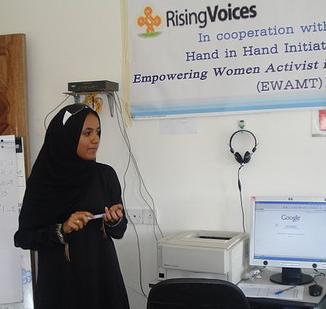- Download MPEG4 Video (.mp4)
- Download Flash Video (.flv)
- Download Audio File (.mp3)
- Subscribe to Rising Voices Videos in iTunes
Pablo Flores from Plan Ceibal, Uruguay's One Laptop Per Chile project, and Blogging Since Infancy presented at this year's Ars Electronica Symposium on Cloud Intelligence.
Pablo asked the audience to consider how those who have the most to gain can benefit from the information amassing online. The value of intelligence, after all, is in solving problems facing society. Flores points to housing, nutrition, and education as three major social issues which can be improved with more access to better information. In order to bring intelligence and information from the cloud to everyday citizens in Uruguay, for example, they need a network of connectivity and devices.
The Uruguayan government was the first to sign on completely to OLPC’s vision of providing a laptop to every school-aged child. The government has also worked with national telecommunications companies to provide free or discounted access to students and their parents around the country. But Flores emphasizes that technological change by itself will not automatically lead to social development.
In order to take advantage of participatory tools a culture of participation must exist. Research studies in Uruguay have found that parents who don't know how a laptop computer and internet access can benefit them are more likely to just let the machines sit unused in the corner. To help parents, teachers, and students better understand the uses and possibilities of the computers, volunteer university students from Montevideo have formed Flor De Ceibo, a club which sends teams of university students and professors out to rural schools to lead workshops with teachers, parents, and students. As part of their workshops they show how the EduBlogging platform – developed by local Uruguayan programmers – can be used to promote participatory learning both inside and outside of the classroom.
Flores points to a class which set up a blog to interact with fellow students across the border in Brazil. Of course such pen pal projects have existed for decades, but the blogs allow the students to interact in real time and incorporate other tools to learn Portuguese and Spanish. His presentation concludes by emphasizing the importance of avoiding black boxes – technological gadgets which function properly, but don't allow us to understand how they function. Plan Ceibal values open source technologies as a way of promoting curiosity so that students are encouraged to look “inside” the programs and adapt them to their cultural needs.
Ethan Zuckerman live-blogged Pablo's presentation. Pablo's conference statement was published in the Ars Electronica 2009 Catalog.



